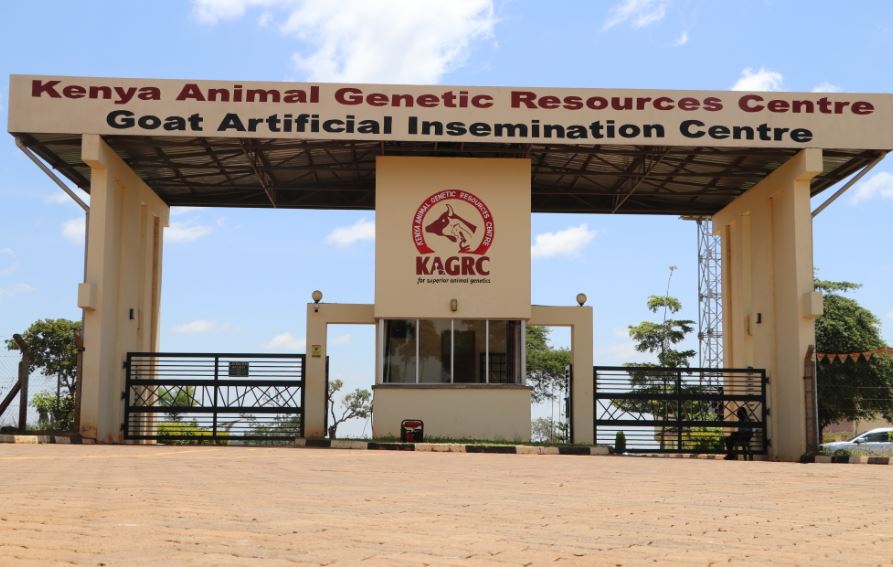
The Kenya Animal Genetic Resources Centre (KAGRC) is taking a bold step in transforming the country’s dairy and meat production through the introduction of Artificial Insemination (AI) technology for goats.
In an effort to boost productivity and enhance food security, KAGRC is working closely with farmers to implement selective breeding techniques that will improve the quality and quantity of milk and meat production in the country.
Speaking during an open day event with goat dairy farmers at the Kutus Ahiti Domba centre, Kirinyaga County, KAGRC Managing Director Benadette Misoi emphasised the importance of AI in modern farming, describing it as a groundbreaking technology that will help farmers maximize their yields.
The event, which attracted a large number of farmers, provided a platform for interaction, knowledge-sharing, and preparation for the official commissioning of a new breeding centre in the next two months.
“Today is a great day for us as we engage with goat dairy farmers, a key segment of livestock farming. AI in goats is a new technology that we are trying to introduce to farmers, with the main objective of increasing productivity. Through selective breeding, we are producing the best semen from our top breeds to ensure higher milk production and better quality meat,” said Misoi.
She explained that KAGRC has a variety of male breeds at its stations, which are used to produce high-quality semen for artificial insemination.
The focus is on both dairy and meat breeds, ensuring that farmers have access to superior genetic material that will enhance their herds.
Misoi expressed her delight at the large turnout of farmers, noting that the interaction was vital in equipping them with essential information about the new technology.
“We are happy to see farmers showing great interest in this initiative. Information is power, and we want to continue passing it on to ensure that farmers make informed decisions. KAGRC works with a network of agents, distributors, universities, and suppliers who provide the necessary chemicals and equipment for our laboratories. It is a collaborative effort that will drive this sector forward,” she said.
The Kenyan government, through the Ministry of Agriculture, has outlined ambitious goals to enhance food security and promote livestock breeding as a key interventions.
Currently, Kenya produces approximately 5 billion litres of milk annually, but the government aims to double this to 10 billion litres by 2027. The introduction of AI technology in goat farming is expected to play a crucial role in achieving this target.
Misoi highlighted the broader impact of the initiative, stating that increased milk and meat production will not only improve food security but also create employment opportunities and boost farmers’ incomes. She reaffirmed KAGRC’s commitment to ensuring that farmers have access to top-quality breeds that guarantee high productivity.
“The main role of KAGRC is to provide farmers with the best genetic material to enhance production. Breeding is a critical aspect of livestock farming, and by improving the quality of our breeds, we can help farmers achieve better yields and higher profits,” she added.
As Kenya moves toward modernizing its agricultural sector, AI technology in goat farming is expected to be a game-changer. By embracing innovative breeding techniques, farmers will be better positioned to meet the rising demand for dairy and meat products while contributing to the country’s economic growth.
The upcoming commissioning of the breeding center will mark a significant milestone in this journey, further cementing Kenya’s position as a leader in livestock genetics and sustainable farming.
"We are doing selective breeding, producing, preserving, and conserving animal genetic material—semen, embryo, tissue, and live animals—while reading breeding sires for the provision of high-quality, disease-free semen for the national and export markets," said Dr. Misoi.
Dr. Misoi added that the centre has also been on the front line to give cow breeds that are the best for both milk and meat, where they give semen for Frisian, Ayrshire, Guernsey, Jersey, Sahiwal, and Boran, as well as Magic 50, adding that the number of bulls per breed is demand-driven by the farmers.
James Murimi Gichovi, a goat farmer from Kirinyaga, has said the open day has been of help, saying he has been using traditional methods to serve his goats, but from the open day he will change to AI technology since he has been enlightened about its merits.
"I have been struggling to get the male goats to serve my goat, but I am proud to say I will be among those who will embrace this new technology throughout my goat farming. I have been able to learn that the more you improve your goat breeds, even when selling kids, the price will increase since it is of the best quality," says Murimi.
Murami added that the five hundred shillings’ charges for the AI service are pocket-friendly compared to arguing for the service to be brought closer to where farmers are.
"The open day has made me learn there is salt and vitamin made for goats only, which I will carry home today and give to my two goats since I have been using the one used by my cows," said Murimi.
Murimi has called other farmers, especially the goat farmers, to attend the agricultural open days and other such events, saying they have more benefit since they enlighten farmers on the new changes in animal farming.






![[PHOTOS] Guardian Angel bus catches fire in Kikuyu](/_next/image?url=https%3A%2F%2Fcdn.radioafrica.digital%2Fimage%2F2025%2F04%2F58287f0a-f201-4a78-87f0-6f147ad8ba8a.jpg&w=3840&q=100)




